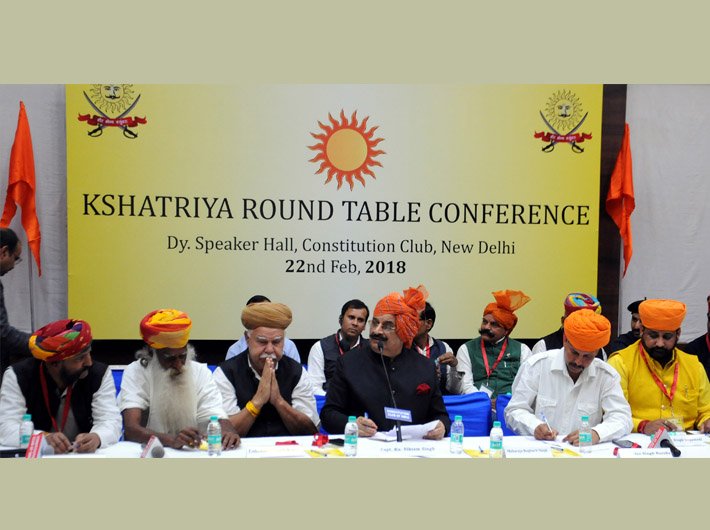There's a popular folktale shaped by the tongues of the bards and storytellers of Rajasthan about the folly of Rajputs.
A Rajput crossing a dense, dark jungle falls into a dry, abandoned well. He is trapped for hours till a passing youth throws him a rope and pulls him up.
Nearing the mouth of the well, he asks, "Oh brave young man, who are you and where are you from?"
The youth announces he's a Rajput and proudly spells out his lineage through several generations.
Taking this for an affront, the Rajput in the well lets go of the rope and lands in the bottom again. He's too vainglorious to be helped up by a Rajput with rival claims to eminence!
For all their valourisation, Rajputs are hardly known for sticking together. Overweening pride gets the better of good sense.
A bit of this was on display at a round table conference of Rajput and Kshatriya leaders held on February 22 at the Constitution Club in Delhi. It was parade of mustachioed men in kurta-pyjamas and colourful turbans. There was much beard-stroking and mustache twirling.
The press note said the Kshatriya leaders were gathering to discuss ways to improve their image, distorted by the media and political parties during the controversy over the film Padmavat. Also billed were discussions on how to seek and obtain job quotas for financially weak Kshatriya communities and decide on a central Kshatriya leadership.
A few minutes into the meeting, one leader, Ajay Singh, was asked to comment. "No, I will not speak," he declared.
The mike was passed to another leader. But Ajay Singh kept interrupting him. "Manyavar, first decide on the agenda," he demanded. "What is it that we have gathered here to discuss?" When he was again called upon to speak, he sulked: "Nahin, hum abhi nahin...."
It was after much cajoling that this leader, who might have been from eastern Uttar Pradesh or Bihar from his Hindi accent, deigned to speak in the largely Rajasthani gathering. (There was a mere sprinkling of leaders from other parts of the country.)
As participants rose one by one to speak, the others sat poker-faced. No expression of agreement or disagreement. Only tight, silent pride. It might have been straight out of depictions of mediaeval court scenes in risible, history-defying Bollywood films and TV serials.
When speakers took too long, they were interrupted in courtly language. "Kshama chahoonga, par is tarah hota raha to ham mein se kai log bol nahin payenge. Vakta ka samay nirdharit karen. (Beg your pardon, but many of us may not get a chance to speak. A time limit should be set."
Padmavat, of course, was on everyone's tongue. "We burnt 19 effigies in protest," a gentleman with muttonchop whiskers said. His voice carried even when the mike malfunctioned. Others gave accounts of how many effigies they had burnt and how many protests they had organised.
Lokendra Singh Kalvi, chief of the Karni Sena that was at the forefront of the violent protests against the Bhansali film, was given a royal reception. The participants all stood up as he walked in. When he spoke, his voice floated over deferential silence.
"It was unfortunate that Padmavat film was released despite popular public mood against it. It hurt our sentiments," he said. "I got assurances from 14 chief ministers that the movie would not be screened. But the SC order prevailed. Kshatriya protests were shown in bad light despite the fact that our history was distorted and maligned."
He said he'd written to the PM and the home minister for the creation of a panel to vet historical films so that they don't hurt popular sentiments and create divisions in society. The participants supported this demand.
The Kshatriyas present took upon themselves the responsibility of building a Ram temple in Ayodhya for two reasons: one, Lord Ram was a Kshatriya, and two, land for construction of the structure there had been donated by Maharaja Sawai Jai Singh of Jaipur in 1717.
"Building the temple there is our right and duty," declared Capt Kunwar Vikram Singh, convener of the round table conference. "We are awaiting a Supreme Court decision. If the matter is not resolved, the onus to construct the temple will lie on us."
Capt Singh also said the conference had decided on demanding reservation for financially weak Kshatriya communities. He said that later in the year a grand Kshatriya Sansad would be organised in Chittorgadh, sacred to the community for its association with Maharana Pratap, its icon of opposition to the Mughals.
No Kshatriya conclave can be complete without bardic glorification. Maharao Raghubir Singh of Sirohi, who won the Padma Shri this year, took it upon himself to do that. His contribution to the conference was a narration of the history of Kshatriyas, from ancient times to 1949. It did not go uninterrupted.
He made an appeal while closing: stay united.
Among the royals present were Maharaj Randhir Singh Bhinder, Raja Rajinder Singh, Sukhdev Singh Gogamedi, Surendra Pal Singh Ammu, Kunwar Mahindra Singh, and Maharaj Rawal Yugpradeep Singh Hamirgarh, who claims direct descendance from Maharana Pratap.
PS: There were three women at the conference.

